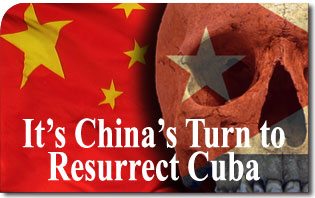 After decades of pumping money into the Cuban prison island, Russia’s efforts ceased due to its own failed economy in 1991. The Russian bear was left hanging with $35 billion in uncollectable debt. Now China’s President Xi Jinping wants to try his hand at fixing the irreparable. He now intends to not only prop up Cuba’s moribund economy, but to coalesce a bloc of socialist nations in Latin America.
After decades of pumping money into the Cuban prison island, Russia’s efforts ceased due to its own failed economy in 1991. The Russian bear was left hanging with $35 billion in uncollectable debt. Now China’s President Xi Jinping wants to try his hand at fixing the irreparable. He now intends to not only prop up Cuba’s moribund economy, but to coalesce a bloc of socialist nations in Latin America.
In the last of a four-stop tour including Venezuela, Argentina and Brazil, Jinping visited his communist allies in Cuba and signed no less than twenty-nine credit, debt and other agreements. China is now Cuba’s largest trading partner at $1.4 billion per year.
As the largest economy in the Brazil, Russia, India and China group of emerging markets, (BRICs), China hopes to flex its economic muscle by shoring up many of the floundering South American economies that Jinping visited. The Chinese president joins Russia’s Vladmir Putin, in looking to unite many of the socialized nations in Latin America and capitalize upon their rich oil and mineral resources. They also hope to turn these nations against American, European and Japanese markets.
By all optimistic accounts the emerging markets should be flying rather than sinking BRICs. A quick look at the emerging market’s performance in 2013, shows that Brazil’s stocks were down -15.9 percent, Chinese -7.1 percent, Russian -4.3 percent and India -3.5 percent. This trend even applies to the smaller more agile and reliable emerging markets such as Turkey that was down -18.3 percent. It is hard to imagine how one failing country can help another in any stable way.
According to the S&P 500, contrast these downward numbers with those of the leading three global economies during the same period. Japan’s stocks grew at +57 percent, the U.S. at +29 percent and Germany ending with a very respectable increase of +26 percent. China and the other BRICs will not be surpassing these markets any time soon since they have to grapple with rampant inflation and market bubbles of their own.
However, flush with Western cash, Jinping took advantage of his trip to mount a threat to the West by announcing the establishment of the New Development Bank to be headquartered in Shanghai to cater to emerging markets. This is primarily because it has not been easy for high risk emerging markets to secure financing from the World Bank or the IMF. This new bank is proposed to finance infrastructure and development projects for emerging markets of socialist persuasion including Cuba, which might be better defined as a submerged market.
China suffers from the massive and unavoidable problem of being an export dependent economy that has suppressed domestic consumption in order to amass capital. Doing so creates a considerable imbalance in an economy the size of China’s rendering this economic model inherently unstable. Thus, in order to continue growth, China must produce more than it consumes and someone else must consume more than they produce, creating significant trade deficits. The current U.S. import/export ratio with China is almost 4:1 and 2013 ended with net balance of $-318.7 billion.1
Investors became enamored with China in the last few decades supported by stunning emerging market growth figures, and few wished to see that these numbers were impossible to sustain without the development of a healthy internal consumer market.
As external demand for Chinese products decrease, there became a need to increase internal purchasing to offset available production capabilities, without which an economy naturally plummets. To offset this lack of external demand, China has created false internal demands through building massive amounts of infrastructure such as housing, “ghost cities,” replica European cities, factories, bridges and highways—that nobody can purchase or use.
With the collapse of the Soviet Union in 1991, Cuba lost more than 75 percent of its foreign trade and worsened its economic crisis. To remedy this situation, Castro naturally looked to China as a comrade less ill than itself. Realizing the opportunity to capitalize upon Cuba’s Chinese, Castro set about to regenerate Havana’s Chinatown by granting the Chinese special privileges allowing them to run small businesses. Unfortunately for Castro, visiting Chinese officials saw Havana’s Chinatown first hand, much like it has been for the last sixty years; mired in abject misery.
In conclusion, there are no conditions to fix any of the ailing economies in socialist or communist countries without the complete abandonment of the flawed principles that caused their failure. China will not be able to help Cuba any more than Russia did by inflicting more of the disease that caused the illness. Looking upon the utterly destructive effects communism has had upon any country where it is imposed, one is left with the impression that the lame are attempting to help the cripple walk as China takes its turn to resuscitate Cuba using the same medicine Russia administered.

